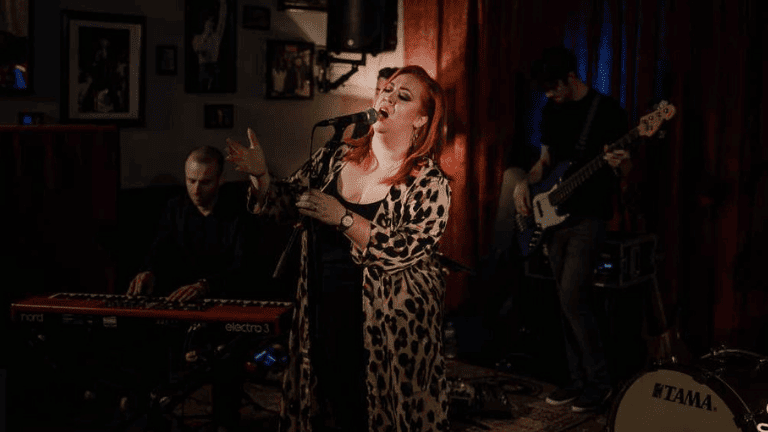JOIN US SEPTEMBER 2024 - APPLY TODAY OR BOOK YOUR PLACE ON ONE OF OUR OPEN DAYS IN BRIGHTON OR SHEFFIELD. UCAS CLEARING IS NOW OPEN.
JOIN US SEPTEMBER 2024 - APPLY TODAY OR BOOK YOUR PLACE ON ONE OF OUR OPEN DAYS IN BRIGHTON OR SHEFFIELD. UCAS CLEARING IS NOW OPEN.

Here are 5 tips that will make you a better vocalist.
I could start this blog off with the standard approach that every one seems to adopt when giving out advice to vocalists; practice, eat healthily, stay hydrated, keep clear of dairy, don’t scream, don’t shout, don’t whisper, don’t drink alcohol… don’t have a life! But I wont. Because let’s face it, cutting out all of those things wont help you to lead a normal life will it?.
In all seriousness though, everyone already knows that to be better at anything, you need to be on top form both physically and mentally and the tips above are all important (if not generic) rules to being the best version of yourself. But that’s just scratching the surface when it comes to becoming a better singer. I should say now that this is just my personal opinion and purely based on my experience, my career so far and my observations as a gigging vocalist out on the live music scene week in and week out. I hope I can offer an insight into how I became a better vocalist and they are all things I wish I’d tried a lot sooner into my journey as a singer.
I’m going to rewind a good twenty years (wow, showing my age now) to when I first heard a song by Jessica Simpson called ‘I wanna love you forever’. I would sing that all day in my room, along with Jess, and I truly thought I could nail this. And then one night I sang it, without the lead part in my ears, at a karaoke bar. Nope, it wasn’t happening. What the hell was happening? It was way too high for me and I sound like a screeching cat. I couldn’t maintain any power to go for the big notes (the thing I thought I was absolutely nailing in my room at home). I was mortified. I wanted the ground to just open up and swallow me whole. I was totally overcome with fear for that song from that point onwards and that was the last time I ever sang it.
So what was so different to when I was singing along with the track in my room?. Well firstly, I didn’t have her support (cheers Jess, thanks for nothing) secondly, that song was just not compatible for my voice at that time in my life. I also have a sneaking suspicion it probably wasn’t even compatible for Jessica Simpsons real voice either, but we’ll keep that between us. And thirdly, I was not confident enough to pull off such a big track yet. I’d been able to blag my way through a Mariah Carey song or two throughout my teenage years but here I was presented with my first set back and reality check. I was 18 and thought I was ‘ready’ and then fear totally blew me out of the water.
Fast forward twenty years; six bands later, a few record deals, a bunch of singles, co-writes, a reality TV winner, thousands of students and some amazing session singing opportunities across the globe, I have found I don’t have any fear now when it comes to trying out new songs and styles that aren’t necessarily in my comfort zone. The amount of contrasting styles I have had to sing for my job, using different areas of my voice each time meant I’d probably tried everything at least once and wasn’t scared anymore of it ‘sounding bad’. I’d let go of all that tension and begun to trust in my ability.
FYI, it’s ok if something doesn’t work for you vocally. Either change it up or practice till you’ve got it, or simply just lose it from your set. No one’s judging you as no two people have the exact same voice and ability.
But becoming a better singer is so much more than just practicing. Let me tell you what I had to do in order to be a better vocalist.
… And I’m still learning every day.
Here is my 'BIG TOP FIVE’ to help you become a better vocalist.
Fear is one of the most crippling factors to your vocal development. Fearing not reaching notes, not sounding good, what you look like or what others think can put an end to you moving forward. So let go of the fear and just start to relax. And relaxing begins with letting go of tension within your body, your neck, your shoulders, your throat and even your tongue. Simple exercises like shoulder rolls, improving your posture, exercising the mouth and face can all help to relieve tension. When your body is relaxed expect to achieve better results vocally.
Make sure you’re singing what is right for your voice (lesson learnt the hard way for me) but always continue to challenge yourself with new material as often as possible. Find out your range but more importantly, where your sweet spot is. Your ‘tessitura’ - the range within which most notes of a vocal part fall. Tessitura is the most acceptable and comfortable vocal range for any given singer where the voice presents its ‘best sounding’ characteristic. Basically the best parts of your voice aren’t necessarily based on your range but more about where your voice sits and sounds its best. Once you know where your voice sounds its sweetest and is at it’s most comfortable, it’s much easier to find songs that will show you off in the right way (I have a number of great exercises that help you find this ‘sweet spot’ and am always happy to help answer any questions).
This may sound stupid (or pretty obvious) but you’d be surprised at the difference great articulation and facial expressions can have on your singing. I think this comes with confidence and points 1 and 2 play a major part in gaining the confidence to experiment vocally. Little exercise - Try singing a line from your favourite song, take on board how you sound doing it, now try singing it just like the original artist, copying any tones and embellishments. Is there a difference in sound, did you have to change the way you say things or elongate words, notes to fit with them? This will open your eyes (and ears) to new ways of singing. Obviously you don’t want to be a copycat singer, but it really is interesting to start using your faces, mouth shapes and posture to find new and interesting ways of singing.
Tone is what's known as the colour or timbre of your singing voice. Every voice has a specific colour, which can be described as warm, dark, or strident. Two singers singing the same song in the same key may sound different — the reason is tone. ... More specifically, you recognised your favourite singer by the tone of voice. I truly believe that you can’t teach tone, it is something you possess already but you can find and develop what tone you do have. It’s always worth thinking about how you are singing certain songs. Does the song require you to convey certain emotions? Is it sad, happy, upbeat etc… Great tone and understanding is what separates an average singer from a great singer. E.g - If you have a nasal tone try working towards reducing the higher end. And if you have a boomy loud voice, try turning the ‘volume’ down a touch and experimenting with a softer tone. Your voice is an instrument and doesn’t need to be so full on all the time. Let the lyrics and story of the song navigate your vocal and stay aware of your tone throughout.
And finally…
Read through your lyrics, understand your song, make sure you believe what you are singing. If its sung half heartedly with no connection, your audience will disengage from your performance too. The same goes for your original songs too. You must believe what you’re singing in order to fully engage the listener. It might be a beautiful ballad or a cheesy pop song… whatever it is, believe it when you sing it. If you don’t believe it… who else will?
Aaaaaaand of course drink plenty of water, rest when you can, don’t over sing and get plenty of practice! Am I even a singer if I don’t mention those things?.
Order a prospectus here or Join our Open Day on Sat June 8th.

- ‘Water bear’ is the common name for a Tardigrade.
- Tardigrades are micro creatures, found everywhere on earth.
- They are the most resilient creatures known.
- They can survive and adapt to their surroundings, even in outer space.
- Their resilience and ability to adapt and survive inspires us in everything we do. We love them.


WaterBear Education Ltd, Hanover House,
118 Queens Road, Brighton BN1 3XG, UK Map
Email: [email protected]
Tel: +44 (0) 1273 726230
WaterBear Sheffield, Unit 4, Gatecrasher,
49 Eyre Lane, Sheffield S1 4RB, UK
Email: [email protected]
Tel: +44 (0) 1143 992720

WaterBear Education Ltd, Hanover House,
118 Queens Road, Brighton BN1 3XG, UK Map
Email: [email protected]
Tel: +44 (0) 1273 726230
WaterBear Sheffield, Unit 4, Gatecrasher,
49 Eyre Lane, Sheffield S1 4RB, UK
Email: [email protected]
Tel: +44 (0) 1143 992720
- ‘Water bear’ is the common name for a Tardigrade.
- Tardigrades are micro creatures, found everywhere on earth.
- They are the most resilient creatures known.
- They can survive and adapt to their surroundings, even in outer space.
- Their resilience and ability to adapt and survive inspires us in everything we do. We love them.
